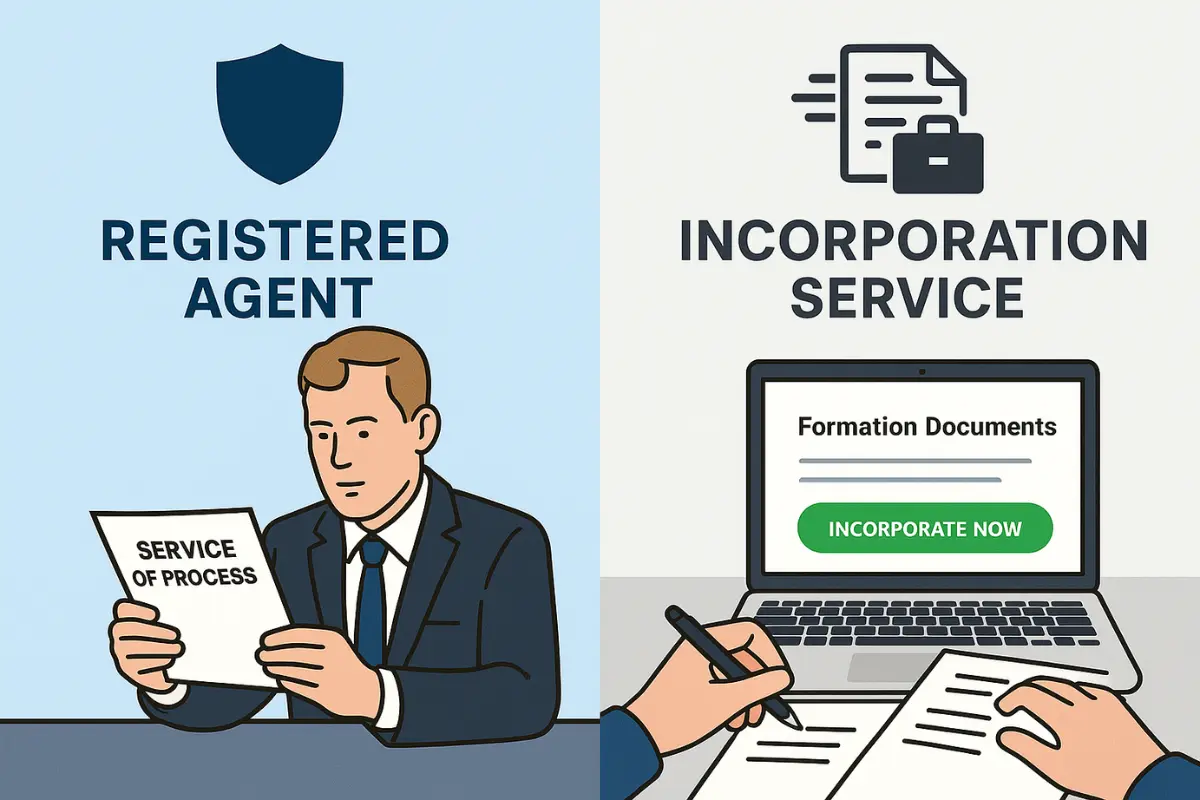Choosing Registered Agent or Incorporation Service

Starting a business comes with a mountain of paperwork and plenty of confusion, especially for first-time owners. One common mix-up is assuming that an incorporation service and a registered agent service are the same thing, when in fact they serve very different purposes. Both play an important role in getting your business up and running, but in distinct ways.
Knowing the difference helps you stay compliant, avoid costly mistakes, and choose the right service for your needs. In this guide, we'll break down what each does, when you might need them, and how to choose the best fit for your business.

What Is a Registered Agent?
A registered agent is an individual or professional service authorized to accept legal documents, compliance notices, and official mail for your business. In some states, they're also called a statutory agent or resident agent.
Formal business entities, including limited liability companies, corporations, and limited liability partnerships, are legally required to have a registered agent in the state where they're formed. The agent is required to maintain a physical office address within the state and must be present during regular business hours to receive legal notifications and official documents on behalf of your business.
When legal action is taken against your company, a process server delivers documents to your registered agent, ensuring you don't miss critical notices. Using registered agent services can also help protect your privacy. Instead of listing your personal or business address in the public record, you can use the agent's address, keeping your information private while maintaining compliance.
What Is an Incorporation Service?
An incorporation service helps a business owner file legal documents to form a business entity, such as a limited liability company, corporation, or nonprofit. These services handle the paperwork and filings needed to officially register your entity in the state where your business operates.
Using professional incorporation services means experts will prepare your Articles of Organization or Articles of Incorporation, check business name availability, and submit everything to the appropriate state agency. Most providers offer add-ons, including EIN registration, trademark services, and registered agent services.
According to the U.S. Small Business Administration, "If you don't register your business, you could miss out on personal liability protection, legal benefits, and tax benefits." Incorporation services offer efficiency and accuracy, helping you launch your business quickly and avoid costly mistakes.
Key Differences Between Registered Agents and Incorporation Services
Registered agents and incorporation services handle separate aspects of business formation and ongoing compliance, each with unique timing and responsibilities. Understanding the fundamental differences clarifies why most businesses need both services at different stages.

Roles and Responsibilities
A registered agent's primary responsibility is to receive legal documents such as service of process, government notices, and compliance-related correspondence on your company's behalf. They act as your official point of contact for legal notifications during regular business hours.
According to SCORE, a nonprofit partner of the SBA, "The registered agent requirement came about as an aspect of due process. A lawsuit against your business cannot move forward in court without your business being properly notified first. The registered agent must maintain a physical address in the state and be accessible during business hours to ensure your business can promptly receive legal papers and official notices. This requirement gives the court an easy way to notify you."
In contrast, incorporation services focus on the administrative setup of your business entity. Their main duties include conducting business name searches, preparing formation documents, filing paperwork with the Secretary of State, and coordinating additional startup services like foreign qualification if you operate multiple locations across different states.
While a registered agent must maintain a physical address and be accessible during regular business hours, incorporation services provide expertise in document preparation and processing. Together, these services support different but complementary aspects of business formation and compliance.
Timing in the Business Formation Process
You typically hire an incorporation service before or during initial formation. They help navigate the startup phase by ensuring formation documents are prepared accurately and filed with the appropriate state agencies.
Registered agent appointment must happen before completing the business formation. You need a registered agent in your state before filing if your business is a formal entity, such as an LLC, corporation, or nonprofit. This means having your registered agent's information ready when submitting Articles of Organization or Incorporation.
The timing and duration of involvement differ significantly. Incorporation services usually provide one-time formation assistance, though many also offer ongoing support like annual report filing and trademark registration. On the other hand, you are legally required to maintain a registered agent year after year. Losing your registered agent can cause your business to fall out of good standing with the state, as registered agents play a critical role in ongoing compliance throughout the life of your business.
Legal vs. Administrative Support
Registered agents provide compliance support, ensuring your business meets state requirements and doesn't miss important legal notices. They act as a buffer against legal complications and help you maintain good standing.
Incorporation services offer administrative support focused on business formation. They handle paperwork, navigate state requirements, and ensure formation documents meet legal standards while managing business entity filing office procedures.
Incorporation services are essential during the startup phase to officially form your business entity, while registered agents are critical for ongoing operations to maintain compliance and ensure you never miss important deadlines or critical legal documents.
Do You Need Both a Registered Agent and an Incorporation Service?
Many new business owners wonder whether both services are actually necessary for business formation and compliance. The answer depends on your experience level, available time, budget, and business goals. While some assume they can handle everything themselves or that one service covers both functions, the reality is more nuanced.
When You Might Only Need One
You might only need to hire a registered agent if you're comfortable handling the incorporation process yourself. Many entrepreneurs file their own formation documents directly with the Secretary of State and choose a professional registered agent to meet compliance requirements, accept legal documents, and forward official mail on their behalf.
Some business owners hire an incorporation service for the formation paperwork and then serve as their own registered agent to save costs. To do this, you must meet registered agent requirements. These requirements include keeping your registered agent information current, maintaining a publicly listed physical address within your state as your registered agent's location, and being consistently available at that location during normal business hours to receive service of process and government correspondence.
Consistent availability is critical because process servers may arrive without notice. Your process agent must be ready to receive documents in a timely manner. Missing legal notices can leave you unaware of lawsuits or subpoenas, creating serious legal and financial risks. This is why many owners prefer using a professional provider.
Conversely, you might only need incorporation services if you already have a reliable registered agent in place and are simply looking to form another business entity.
Scenarios Where You Need Both
Most business owners find that using both professional incorporation services and registered agents provides the best combination of convenience, protection, and compliance assurance. Entrepreneurs who want to focus on growing their business rather than navigating legal requirements benefit greatly from comprehensive support.
Incorporation services ensure your formation documents are prepared and filed correctly, while registered agents provide ongoing compliance support, privacy protection, and the ability to accept legal documents on your behalf.
Serving as your own registered agent means your address will be publicly listed, opening you up to solicitors and privacy and security concerns. Home-based business owners often opt for a professional registered agent service to keep their personal addresses off public records. A qualified registered agent provider paired with incorporation services creates a professional, efficient setup without exposing sensitive personal information.
If you conduct business in multiple states, you are legally required to have a registered agent in each state where you operate. A national registered agent service can simplify managing multi-state compliance, especially when combined with reliable incorporation guidance.
Bundled Services: Are They Worth It?
Many incorporation services offer packages that include both formation assistance and registered agent services. These bundled services can offer significant value and convenience for new business owners.
The main advantage is simplicity: instead of coordinating with multiple providers, you work with one company that handles both incorporation and registered agent needs. This reduces complexity and often results in cost savings.
However, bundled services may not always be the most cost‑effective option long‑term, and some providers do not have clear, transparent pricing. Certain companies offer free business formation if you sign up for registered agent services, or an initial discounted promotional period for registered agent services if you form your business entity with them. After the promo period, rates may increase and can be significantly higher than those of other competitors. Some providers don't bundle services at all, instead offering each service as a stand‑alone product.
Before committing, it's important to understand all ongoing costs, renewal fees, additional charges, and cancellation policies. For startups or small business owners seeking convenience and ongoing support, choosing one single provider for both incorporation and registered agent services can be a smart choice, especially when weighing ease of use against potential long‑term savings elsewhere.
How to Choose the Right Service Provider
Selecting reliable providers requires careful evaluation of key factors. The providers you choose play important roles in legal compliance and formation success, making this decision crucial for long-term operations.

Key Features to Look for in a Professional Registered Agent Service
Finding the right registered agent is essential for keeping your business compliant and avoiding costly oversights. A reliable provider should have guaranteed availability during business hours and maintain a physical address in your state to receive legal notices and official documents on your behalf. This ensures your entity’s registered agent never misses critical filings or other important documents that could impact your good standing.
Choose Professional registered agent services that include compliance monitoring and deadline reminders for annual reports and state filings. These proactive alerts help you meet every requirement and avoid penalties.
Privacy protection is another must‑have. Using the agent’s business address for public records shields your personal address from unwanted contact and keeps sensitive information secure.
If you plan to expand, a national registered agent service ensures consistent coverage in multiple states, simplifying compliance as your operation grows.
Look for providers offering electronic document delivery along with physical mail forwarding so you have multiple ways to access materials. A secure online portal lets you review scanned copies of important documents right away, rather than waiting for postal delivery.
Finally, choose a provider with transparent, straightforward pricing and no hidden fees, so you can budget with confidence for ongoing compliance support.
What Makes a Good Incorporation Service
Quality incorporation services offer transparent pricing, clear filing timelines, and comprehensive formation support. Avoid providers with hidden fees or unclear pricing that could lead to unexpected costs.
Look for strong customer support and responsive communication, since incorporation often involves questions that need prompt answers to keep the process smooth. Research customer reviews and testimonials to identify any red flags like poor communication, delayed filings, or unsatisfactory service.
Experience with your state's specific requirements is crucial, as forms and procedures vary widely. Choose providers with proven expertise in your state and a successful track record.
Additional business services can add significant value and convenience. Look for providers offering extras like EIN registration, annual report filing, trademark assistance, and registered agent services to streamline your entire business setup.
Top-Rated Providers to Consider
When evaluating registered agent and incorporation services, consider companies that have strong reputations, transparent pricing, and services aligned with your business needs.
-
InCorp was selected by Forbes as the top pick for their 11 Best Registered Agent Services Of 2025, noting InCorp's "reasonable pricing and discounts if you sign up for a long-term agreement." InCorp offers reliable registered agent support and a long list of additional business services, all at competitive rates, making us a solid choice for new business owners who need help in a variety of areas.
-
Bizee (formerly Incfile) is known for affordable formation packages and user-friendly platforms, offering services that appeal to startups seeking value and simplicity.
-
LegalZoom provides comprehensive formation services with extensive additional legal resources, popular among those who want additional legal support alongside incorporation.
-
Northwest Registered Agent specializes in registered agent services with a focus on privacy protection and excellent customer care, charging straightforward pricing without hidden fees.
Each provider offers unique strengths in affordability, support, or compliance; choose based on what best fits your priorities.
Final Thoughts: Registered Agent vs. Incorporation Service – Which Is Right for Your Business?
Understanding the difference between a registered agent and an incorporation service is key to successfully forming your business entity. Incorporation services handle the legal formation, while a professional registered agent ensures ongoing compliance, receives official mail and legal notices, and protects your privacy.
When starting a new company, most business owners benefit from using both services for reliability, convenience, and peace of mind. Choosing one provider for both roles can save time and money, while also giving you access to additional business services that support growth. This approach helps ensure your business operates legitimately and avoids potential problems down the road.
FAQs
Can I be my own registered agent?
Yes, but it requires maintaining a physical address in your state and being available during normal business hours year-round. Most business owners find professional registered agents more convenient and reliable for maintaining good standing. Just one missed document could have serious consequences. For example, if you fail to receive a legal notice of a lawsuit against your company, the court may automatically rule against you.
Is a registered agent included in incorporation services?
Many incorporation services include registered agent services, often at a discounted rate or free for the first year. However, renewal fees may increase in the second year and beyond. Be sure to review the service terms carefully to understand what's included and the ongoing costs after any promotional period ends.
What happens if I don't appoint a registered agent?
Operating without a registered agent can result in serious consequences, including loss of good standing, missed compliance-related documents and legal notices, potential default judgment, and administrative dissolution. Having a registered agent is a legal requirement in all states for formal business entities. Without one, your corporation's official point of contact is missing, which can lead to serious legal matters.
Do you need to appoint a lawyer as your registered agent?
No. An attorney or law firm can serve as a registered agent for an LLC or corporation and may also provide legal advice to the business. However, this is not required, and for many small businesses, a professional registered agent service is often more cost‑effective and just as reliable.
Are online incorporation services trustworthy?
Yes, many online incorporation services are reliable and provide quality formation assistance. Look for providers with strong reviews, transparent pricing, clear guarantees, and responsive support. Established companies with years of experience typically offer the most reliable service.
Can I switch registered agents after forming my business?
Yes, you can change registered agents anytime. The process is generally straightforward, requiring filing a form with the Secretary of State and paying a small fee. Your new registered agent must consent to the appointment and meet all state requirements for serving in that role. When you hire a registered agent to replace your current one, ensure they can provide registered agent services that meet your business needs.
Take the Next Step with InCorp: Your Trusted Partner for Business Success
Ready to simplify your business formation and compliance? InCorp offers expert incorporation services and reliable registered agent support tailored to your needs. With competitive pricing, nationwide experience, and a commitment to exceptional customer service, InCorp makes it easy to focus on growing your business while we handle the paperwork.
With InCorp you get a stress-free setup, ongoing compliance, and continued peace of mind. Don't wait, get started today to give your business the strong foundation it deserves.
Share This Article:
Stay in the know!
Join our newsletter for special offers.